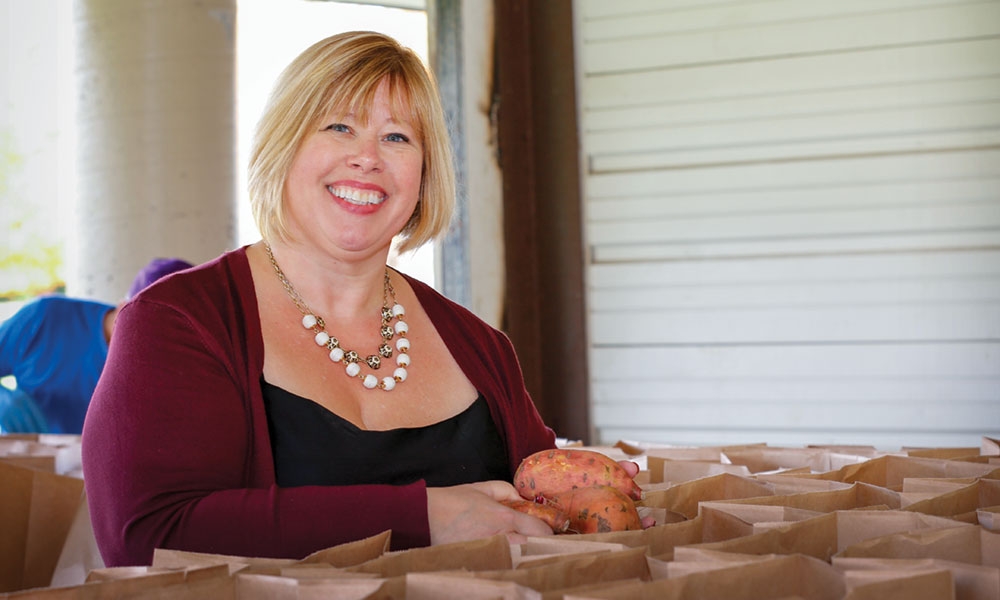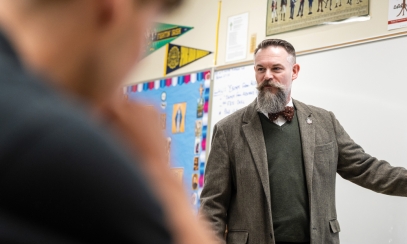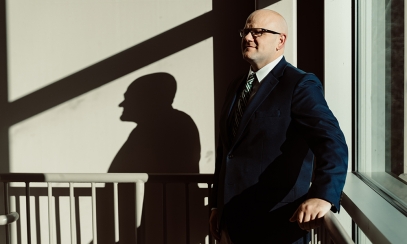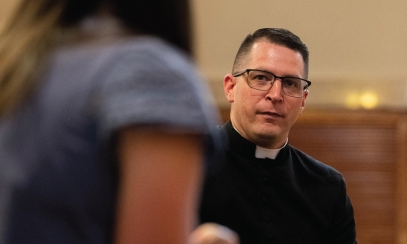
A sunnie outlook
Getting your Trinity Audio player ready...At Christmastime, many people find it hard to make ends meet. For many others, that’s true the whole year round. This month, Stephanie Van Koevering checks in with Sunnie Johnson-Lain, the new CEO of Catholic Social Services of Washtenaw County (CSSW), to find out how her ministry is stepping up to provide food, supplies, and vital services.
At Christmastime, many people find it hard to make ends meet. For many others, that’s true the whole year round. This month, Stephanie Van Koevering checks in with Sunnie Johnson-Lain, the new CEO of Catholic Social Services of Washtenaw County (CSSW), to find out how her ministry is stepping up to provide food, supplies, and vital services.
In 2024, after the retirement of skilled leader Peg Bravo, the organization entered a new phase of growth under Sunnie’s leadership. With a staff of 60 and many changes on the horizon, the future is bright.
A journey of faith and service
Sunnie’s path to Washtenaw County is rooted deeply in her background with St. Vincent de Paul, where she spent over a decade rising through the ranks and embracing the Vincentian spirituality of active contemplation — where faith is not just about prayer but also action. Originally from Massachusetts, she relocated to Dayton, Ohio, to raise her children and be near family.
"My son had significant disabilities, and I wanted to stay home with him and our daughter. Dayton provided the support system we needed, and I am so grateful for those years," Sunnie shares. Sadly, her son passed away at age 19, a tragedy that further shaped her commitment to service. “I’m even more thankful for the time I had with him.”
After staying home with her children for a decade, Sunnie returned to school for pastoral ministry and began working with the Archdiocese of Cincinnati.
From there, Sunnie took on leadership roles with St. Vincent de Paul in Dayton, working her way up to the executive team. In 2019, she moved to a newly constructed outreach center in Cincinnati, overseeing operations and strategic planning, with a particular focus on unifying diverse programs and communities.
Sunnie’s transition to her new role is part of her desire to move from providing basic emergency needs to fostering long-term transformation in people’s lives. “I wanted to be a gardener, not a mechanic. I wanted to be part of something that plants seeds for the future, and that’s what this ministry is all about.”
A new vision
Sunnie comes to the ministry at a pivotal moment. The organization is transitioning its name to Catholic Charities of Washtenaw County and charting a new path forward in partnership with the Church and its community.
“We are Catholic Charities. That’s who we are, and this change reflects our mission to do the corporal and spiritual works of mercy,” Sunnie says. But the rebranding is not just about the name; it’s about expanding the organization’s reach and building deeper connections with the Catholic community.
Responding to growing needs
The needs in Washtenaw County are greater than ever. “Our food pantry has broken records every month,” Sunnie says. “We’re serving over 100 households each day we’re open, and we’re considering expanding to a third day a week.”
The ministry is also seeing an influx of immigrants and non-native English speakers, many of whom are in desperate need of assistance. In addition, their reentry program, which supports individuals transitioning from incarceration, has grown by more than 50 percent during the past year alone.
“Another major challenge surrounds the ministry’s behavioral health services,” Sunnie says. “There’s a tremendous need for mental health support, especially among those who rely on Medicaid or sliding-scale payments. Unfortunately, it’s not a sustainable financial model for many providers, but we’re committed to serving this population because they are the ones who need it most.”
Sunnie says the ministry’s approach is all about meeting people where they are.
“We know that before we can help someone move forward, they need to have their basic needs met. Food, shelter, electricity — these are the building blocks for stability. Once those needs are addressed, we can work with them on more systemic, long-term goals, whether it’s through job training, mental health services, or housing assistance. The goal is transformation — to help people change their stories, not just survive their circumstances.”
Despite the number of initiatives happening now, Sunnie has prioritized one she believes can make a big difference: an on-site chapel.
“Having Christ present in our building would be a profound way to integrate faith into the work we do every day,” she says. “We already have some beautiful pieces from Father Gabriel Richard High School’s previous chapel, and I’m excited about what this space could mean for our staff and the people we serve.”
For now, growth and visioning are the ministry’s watchwords.
“I see us continuing to grow in our mission of mercy,” she says. “But more than that, I hope we can deepen our relationships with the Catholic community and invite more people to join us in this work. It’s not just about providing services — it’s about being the hands and feet of Christ, transforming lives in his name.”



